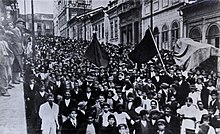User:Гармонический Мир/Brazilian Workers Confederation
This article may be a rough translation from Portuguese. It may have been generated, in whole or in part, by a computer or by a translator without dual proficiency. |
The Brazilian Workers Confederation (Portuguese: Confederação Operária Brasileira; abbreviated COB) was founded in 1906, and is the first trade union of workers in Brazil. After intense union activity, its membership dropped dramatically in the 1930s with a split that occurred due to internal conflict and government repression, and was then revived in 1986.
Inspired by the French CGT, the COB was created from the revolutionary unionist perspective. The COB is associated with the International Workers Association (Spanish: Asociación Internacional de los Trabajadores, AIT).
History[edit]
The rise and fall of the Foundation[edit]

The COB was founded in 1906 by the Congress of Workers of Brazil, which determined the start of its operation for 1908. Inspired by the model of the French Confédération générale du travail, which was then loyal to the First International unionism, it had its temporary headquarters in the streets of the Hospice, 156 in Rio de Janeiro, and its secretary general at that time was Ramiro Moreira Lobo.
He had a role in the general strike in São Paulo in July 1917. Their militancy was intense, because the Brazilian trade union movement was influenced by significant revolutionary unionists and anarchists. It was led by the section of the COB of São Paulo (FOSP), until it began to decline after 1935 with the dictatorship of Gertulio Vargas, and because most of the unions began to be controlled by political parties. After this, a few libertarians remained, but only with workers from the mid-1970s did it begin to regain some of its presence in the labor movement.
Reactivation and relaunch[edit]
Due to the existence of trade unionism by the Coptic and in control of left-wing political parties, organizations were formed for the freedom of trade union militancy through the so-called "opposition agreement". Some of the anarchist workers' groups participated in such competitions through the union of Oposição a Libertarian Coletivo Estrutura Association, Cloe, and CLOS, or Libertarian Coletivo of Oposição Association, who served between 1979 and 1984.
At the congress of the formation of CUT (in which various factions joined unions), the proposals were rejected CLOS, that's when it dissociates itself from this which was now being copte by the Workers' Party. From this fact articulate regional groups to guide the regional Protest Days Libertarias, who were preparing for further decisions by the Anarchist Congress 100 years from May 1, giving rise to the emergence of the Movement for revival of the CBD / AIT in 1986.
Principles and organization[edit]
Today the union is reducing its anarcho-syndicalist organization and opposes criticism of institutionalized bureaucratic unions, to these states that are delineated by an authoritarian and partisanship unable to express the reality interests of the working class. For this reason, the COB promotes a fair pay adjustment that ensures the necessities of life and calls for the reduction of shift for all job categories, with the intention of establishing the conditions for release of workers in the domain of state and the government as well as political parties that support them.
It is comprised mostly of independent trade unions "sindivários," union of arts and crafts style of the various unions for various Spanish or Argentine resistance societies, which are established in various cities. The COB integrates its while two regional federations that are FOSP (Federação Operária São Paulo) and FORGS (Federação Operária do Rio Grande do Sul) also profile anarchist. In the confederation, political parties unable to participate nor affiliated to them. Currently, both the federations as the regional confederation are in the process of restructuring and activation. The COB is linked to the reconstruction process of the Continental American Workers Association (ACAT) and is part of the International Workers Association (AIT), the latter is the largest international trade union anarchists.
Federations[edit]
Operária Federação de São Paulo (FOSP), Federation of Labor of São Paulo, is a former workers' organization paulistas has now been reactivated, with the FOSP Workers' Federation Rio Grande do Sul (FORGS), which has the same federal status. Were based mostly anarchists at the time suggested that the general strike as a means of struggle. They held the banner of the First International "The emancipation of the workers will be the work of the workers themselves."[1] They are formed by "sindivários," and are currently undergoing restructuring and activation with Confederação Brasileira Operária are part of that.
added reference

